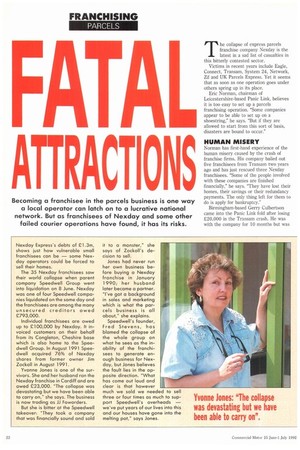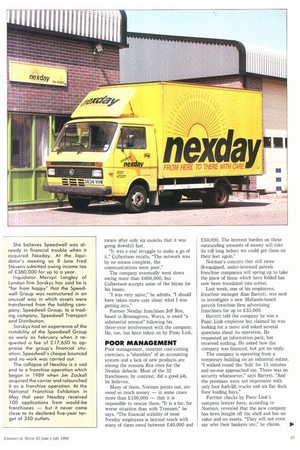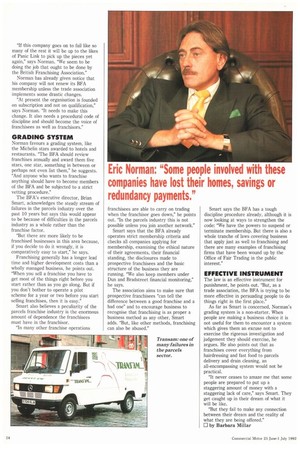Becoming a franchisee in the parcels business is one way
Page 26

Page 27

Page 28

If you've noticed an error in this article please click here to report it so we can fix it.
a local operator can latch on to a lucrative national network. But as franchisees of Nexday and some other failed courier operations have found, it has its risks. The collapse of express parcels franchise company Nexday is the latest in a sad list of casualties in this bitterly contested sector.
Victims in recent years include Eagle, Connect, Transam, System 24, Network, Zif and UK Parcels Express. Yet it seems that as soon as one operation goes under others spring up in its place.
Eric Norman, chairman of Leicestershire-based Panic Link, believes it is too easy to set up a parcels franchising operation. "Some companies appear to be able to set up on a shoestring," he says. "But if they are allowed to start from this sort of basis, disasters are bound to occur."
HUMAN MISERY
Norman has first-hand experience of the human misery caused by the crash of franchise firms. His company bailed out five franchisees from Transam two years ago and has just rescued three Nexday franchisees. "Some of the people involved with these companies are finished financially," he says. "They have lost their homes, their savings or their redundancy payments. The only thing left for them to do is apply for bankruptcy."
Birmingham-based Gerry Culbertson came into the Panic Link fold after losing Z20,000 in the Transam crash. He was with the company for 10 months but was aware after only six months that it was going downhill fast.
"It was a real struggle to make a go of it," Culbertson recalls. "The network was by no means complete, the communications were poor."
The company eventually went down owing more than £600,000, but Culbertson accepts some of the blame for his losses.
"I was very naive," he admits. "I should have taken more care about what I was getting into."
Former Nexday franchisee Jeff Rea, based in Bromsgrove, Worcs, is owed "a substantial amount" following his three-year involvement with the company. He, too, has been taken on by Panic Link.
POOR MANAGEMENT
Poor management, constant cost-cutting exercises, a "shambles" of an accounting system and a lack of new products are among the reasons Rea cites for the Nexday debacle. Most of the 32 franchisees, by contrast, did a good job, he believes.
Many of them, Norman points out, are owed so much money — in some cases more than £100,000 — that it is impossible to rescue them. "It is a far, far worse situation than with Transam," he says. "The financial stability of most Nexday employees is beyond reach with many of them owed between £40,000 and E50,000. The interest burden on these outstanding amounts of money will take its toll long before we could get them on their feet again."
Norman's concern that still more ill-equipped, under-invested parcels franchise companies will spring up to take the place of those which have folded has now been translated into action.
Last week, one of his employees, franchise manager Alan Barrett, was sent to investigate a new Midlands-based parcels franchise firm advertising franchises for up to £35,000.
Barrett told the company he was a Panic Link employee but claimed he was looking for a move and asked several questions about its operation. He requested an information pack, but received nothing. He asked how the company was financed, but got no reply.
The company is operating from a temporary building on an industrial estate. "I walked round the 'hub' for 15 minutes and no-one approached me. There was no security whatsoever," says Barrett. "And the premises were not impressive with only four fork-lift trucks and six flat dock floor loading bays."
Further checks by Panic Link's company lawyer have, according to Norman, revealed that the new company has been bought off the shelf and has no value and no assets. "They will not even
say who their bankers are," he claims. II.
"If this company goes on to fail like so many of the rest it will be up to the likes of Panic Link to pick up the pieces yet again," says Norman. "We seem to be doing the job that ought to be done by the British Franchising Association."
Norman has already given notice that his company will not renew its BFA membership unless the trade association implements some drastic changes.
"At present the organisation is founded on subscription and not on qualification," says Norman. "It needs to make this change. It also needs a procedural code of discipline and should become the voice of franchisees as well as franchisors."
GRADING SYSTEM
Norman favours a grading system, like the Michelin stars awarded to hotels and restaurants. "The BFA should review franchises annually and award them five stars, one star, something in between or perhaps not even list them," he suggests. "And anyone who wants to franchise anything should have to become members of the BFA and be subjected to a strict vetting procedure."
The BFA's executive director, Brian Smart, acknowledges the steady stream of failures in the parcels industry over the past 10 years but says this would appear to be because of difficulties in the parcels industry as a whole rather than the franchise factor.
"But there are more likely to be franchised businesses in this area because, if you decide to do it wrongly, it is comparatively easy to start," he says.
Franchising generally has a longer lead time and higher development costs than a wholly managed business, he points out. "When you sell a franchise you have to get most of the things right before you start rather than as you go along. But if you don't bother to operate a pilot scheme for a year or two before you start selling franchises, then it is easy."
Smart also believes a peculiarity of the parcels franchise industry is the enormous amount of dependence the franchisees must have in the franchisor.
in many other franchise operations franchisees are able to carry on trading when the franchisor goes down," he points out. "In the parcels industry this is not possible unless you join another network."
Smart says that the BFA already operates strict membership criteria and checks all companies applying for membership, examining the ethical nature of their agreements, their financial standing, the disclosures made to prospective franchisees and the basic structure of the business they are running. "We also keep members under Dun and Bradstreet financial monitoring," he says.
The association aims to make sure that prospective franchisees "can tell the difference between a good franchise and a bad one" and to encourage business to recognise that franchising is as proper a business method as any other, Smart adds. "But, like other methods, franchising can also be abused." Smart says the BFA has a tough discipline procedure already, although it is now looking at ways to strengthen the code: "We have the powers to suspend or terminate membership. But there is also a whole tranche of laws covering business that apply just as well to franchising and there are many examples of franchising firms that have been wound up by the Office of Fair Trading in the public interest."
EFFECTIVE INSTRUMENT
The law is an effective instrument for punishment, he points out. "But, as a trade association, the BFA is trying to be more effective in persuading people to do things right in the first place."
As far as Smart is concerned, Norman's grading system is a non-starter. When people are making a business choice it is not useful for them to encounter a system which gives them an excuse not to exercise the rigorous investigation and judgement they should exercise, he argues. He also points out that as franchises cover everything from hairdressing and fast food to parcels delivery and drain cleaning, an all-encompassing system would not be practical.
"It never ceases to amaze me that some people are prepared to put up a staggering amount of money with a staggering lack of care," says Smart. They get caught up in their dream of what it will be like.
"But they fail to make any connection between their dream and the reality of what they are being offered."
by Barbara Millar














































































